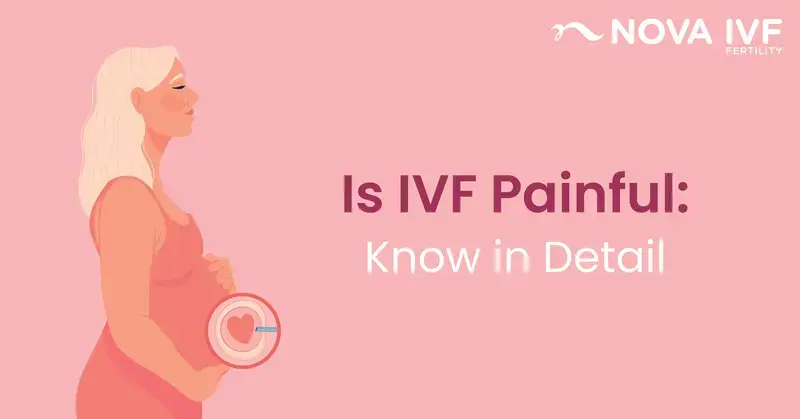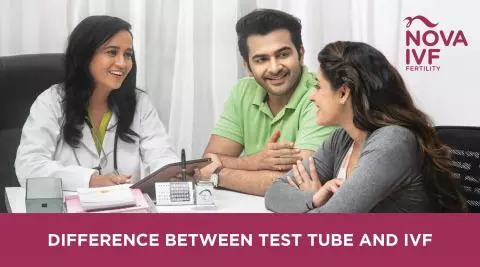Is IVF Painful? What to Expect During Treatment

A popular assisted reproductive technology (ART), in vitro fertilisation (IVF) is a life-changing treatment for many couples and individuals. People who are experiencing infertility or wish to preserve their fertility and delay childbearing opt for IVF. Different people respond to IVF differently, whether it is about success rates or pain tolerance; pain is a subjective experience and normally IVF isn’t considered a painful process.
Since IVF is a complex process, many people find themselves wondering how it works, is IVF procedure painful, and more. This article aims to clarify these doubts.
How IVF Works?
IVF procedure involves different stages to achieve a healthy pregnancy. Below-mentioned step can give an idea about what to expect during the process:
1. Stimulation of Ovaries
Since IVF treatment involves stimulation of the ovaries according to the IVF procedure timelines, your fertility expert may prescribe you medications to suppress your natural menstrual cycle. Additionally, these medications improve the efficiency of the IVF treatment in further stages. Soon after this, medication to stimulate the ovaries is administered. Generally, women are taught to self-administer this medication, which come in the form of injections, at regular intervals.
Follicle stimulating hormone (FSH) is administered during this stage to increase the production of mature eggs, also called oocytes. Fertility doctors aim to increase the number of mature eggs produced by your body in 1 IVF cycle as much as possible to have a successful retrieval session.
Your fertility clinic may keep a tab on your health during this process and recommend regular screening tests to observe your progress. Nearing the end of your ovary stimulation, you will likely be given human chorionic gonadotrophin (hCG) injections to help mature your eggs according to the standard timeline.
2. Oocyte or Egg Retrieval
Your fertility specialist will call you in for blood tests and ultrasound to examine your ovarian reserve. Oocyte retrieval date is set according to the test results.
During the process of oocyte retrieval, you will be sedated, and the doctor will retrieve your eggs using a needle. The needle passes through your vagina to collect oocytes from the ovaries; the whole procedure is guided by ultrasound and usually takes no more than 20 minutes.
The higher the number of top-quality eggs produced by your body, the higher the chances of successful fertilisation. You will be given medication in preparation for embryo transfer after egg retrieval.
Around the time of your egg retrieval, your partner will be asked to provide a fresh sperm sample. These sperms are washed and spun to separate healthiest sperms from the batch for fertilisation. If you are using donor’s sperm, they are prepared in a similar manner.
3. Egg Fertilisation
Collected oocytes during retrieval process are then mixed with your partner’s or donor’s sperm sample. This process takes place in the embryology lab by expert embryologists. Some couples are recommended an advanced IVF procedure—intra-cytoplasmic sperm injection (ISCI)—to combat infertility caused by extremely low sperm count of the male. This procedure involves the injection of a single sperm into an egg.
The fertilised eggs are kept under observation for some time before being transferred to the woman’s womb.
4. Embryo Transfer
After being kept in the incubator in the IVF (embryology) lab, healthy embryos that have survived are graded. One or two of these embryos are transferred into the woman’s womb and the rest are usually frozen to be used later.
Transfer procedure requires a thin tube (catheter) to be inserted through the vagina into the womb. The procedure is simple and is completed within a few minutes. The woman is allowed to rest for at least 20 minutes before she is discharged.
The IVF Procedure: What To Expect? Is IVF procedure painful?
Different stages of IVF involve different processes and each step has its own set of challenges. The first stage of IVF treatment—ovarian stimulation—requires several injections to be administered to the woman at regular intervals for about 10-12 days. A critical phase in the IVF journey, these injections are given either via the skin or the muscles. They are not extremely painful on their own but given on a regular basis multiple times a day can cause soreness at the injection site. Many women chose to inject themselves on their own, while others prefer their loved ones or the fertility clinic to help.
Next step of IVF, the egg retrieval process is not really painful as such because you are sedated. However, after gaining consciousness, some women experience cramping in their lower abdomen along with clear or blood vaginal discharge for a few days after the treatment.
People also wonder is embryo transfer in IVF painful. Generally, most women experience only mild to moderate cramps following embryo transfer. In case you don’t get pregnant in a particular IVF cycle, the procedure is repeated from start according to your preference and the doctor’s guidelines.
Dealing with Grief After an IVF Failure
The success rate of IVF in best case scenarios is not more than 40% in one cycle. Thus, women are likely to experience failure of an IVF cycle, and it can be heartbreaking. Having a realistic expectation from IVF treatment is necessary to minimise the discomfort and emotional pain of an IVF cycle.
It requires about 3 -4 rounds of IVF for women to become pregnant, but it is not standard for every individual. Some people experience success in the first attempt, while others require multiple rounds of IVF to conceive.
Once you have the negative results from a pregnancy test, it is important allow yourself the time to deal with the emotions and give your body enough time to prepare for another round of IVF. Having a good support system helps in such cases, as women are prone to getting depressed after an IVF failure. It may help to know that you are not alone, and many women experience similar hardships.
The medication used in an IVF treatment cycle also influences your overall mood and irritability. Thus, many people consider seeking out a skilled therapist to grieve properly.
The compassionate team at Nova IVF Fertility will guide you through every step of the process and provide you with as much support as possible to navigate through the hardships and get to a successful pregnancy.
Conclusion
There is no concrete answer to the question—is IVF a painful process? It depends on the sensitivity of an individual as each woman has a different response to IVF treatment. Some women experience moderate cramping after egg retrieval and embryo transfer, while others have only mild discomfort. However, IVF is not viewed as a painful procedure. You are not supposed to be in extreme pain during any part of the IVF process; if you are experiencing extreme amounts of pain, you are advised to consult your doctor immediately. This is because extreme amount of pain could be a sign of complication, such as ovarian hyperstimulation syndrome. To combat the aversion to needles, which most people have, it is recommended that you bring a loved one with you for comfort.
‘Is IVF painful’ is one of the most common questions people ask about IVF. There is a possibility of experiencing pain and discomfort during IVF like any medical procedure. IVF is a complex process that improves people’s chances of conceiving and start a family. Thus, people overlook the mild pain and discomfort caused during the procedure in the hopes of having a child.
> FAQs about IVF Discomfort
Q. How to prepare your body for IVF?
A. The best way to prepare your body for IVF treatment and optimise your chances of conception, you are recommended to avoid alcohol and quit smoking, workout regularly in moderation, eat a healthy, balanced diet, and get ample sleep regularly.
Q. Is IVF painful or not?
A. Many people consider IVF to not be a painful procedure, but every woman’s body responds to the treatment differently. There is no one way to answer the question—is IVF treatment painful—because some women experience slight discomfort during ovarian stimulation process and mild to moderate cramping for a few days after the egg retrieval and embryo transfer.
Q. How long does an IVF cycle take to show results?
A. After embryo transfer in an IVF cycle, it can take about 9-10 days for pregnancy test to show accurate results. If the results are positive, you will start visiting your obstetrician-gynaecologist for consultation and regular monitoring. If the results are negative, you will likely start another round of IVF treatment after some time.
Q. Are injections in IVF procedure painful?
A. Injections involved in the ovarian stimulation of the IVF treatment can cause mild stinging at the injection site for a few seconds when you administer them. However, they don’t cause significant pain for most people.
Q. Are children born through IVF treatment normal?
A. Yes. Children born through IVF are fertilised in the embryology lab instead of the mother’s womb, which is the only major distinction between children born through IVF and children born naturally.
 Infertility Counselling
Infertility Counselling Female Infertility Treatment
Female Infertility Treatment Andrology Treatment
Andrology Treatment Fertility Enhancing Surgeries - Female
Fertility Enhancing Surgeries - Female Fertility Enhancing Surgeries - Male
Fertility Enhancing Surgeries - Male Endoscopy Treatment
Endoscopy Treatment IUI Treatment
IUI Treatment IVF Treatment
IVF Treatment ICSI Treatment
ICSI Treatment Advanced IVF Solutions
Advanced IVF Solutions Embryology
Embryology Vitrification Egg, Embryo, Sperm Freezing
Vitrification Egg, Embryo, Sperm Freezing Preimplantation Genetic Testing (PGT)
Preimplantation Genetic Testing (PGT) Donation Program Embryo / Egg / Sperm
Donation Program Embryo / Egg / Sperm Self-cycleTM IVF
Self-cycleTM IVF

 Self-cycleTM IVF
Self-cycleTM IVF










